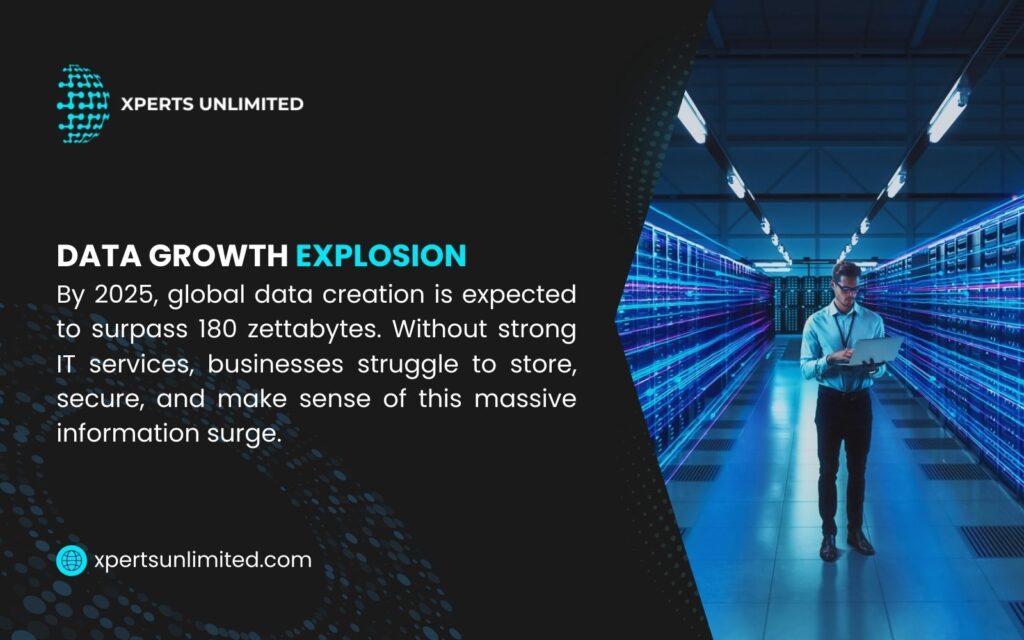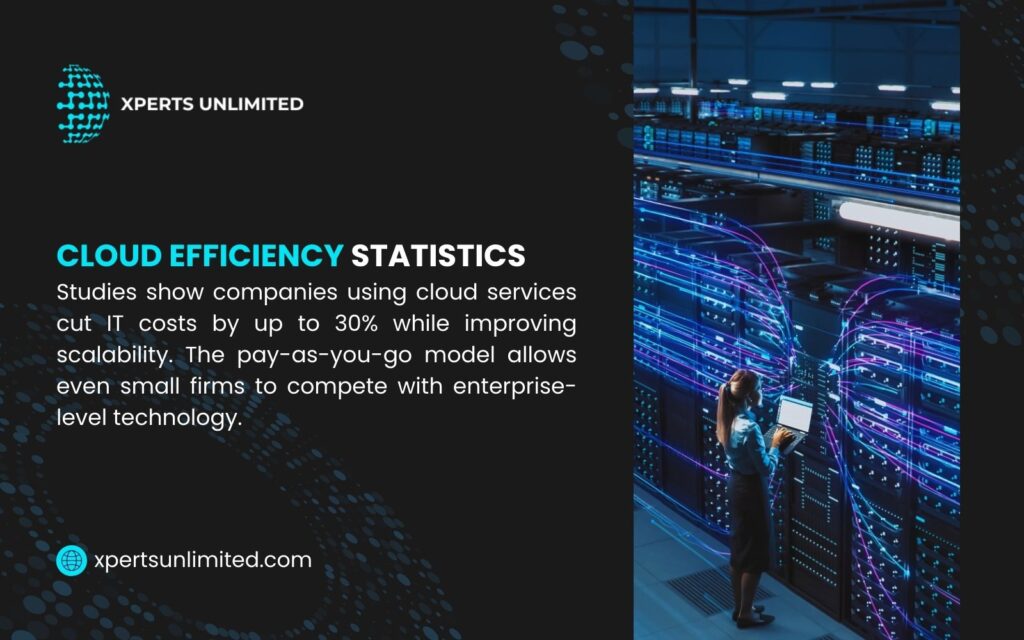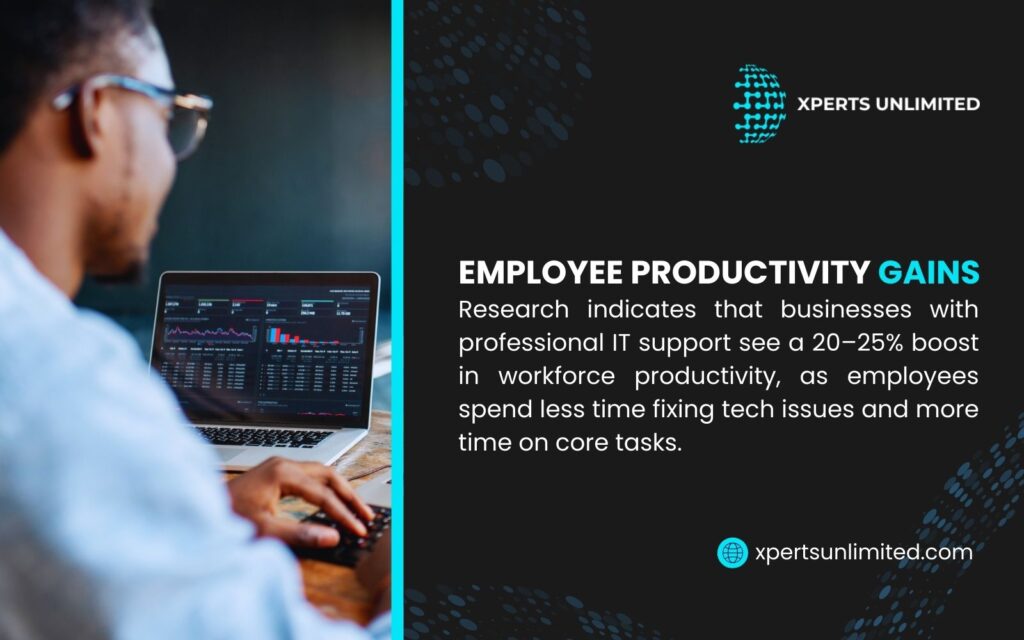Walk into any business office in 1995 and you’d probably find one computer person managing a handful of desktop computers and maybe a simple network. Fast forward to today and that same business might be juggling cloud services, cybersecurity threats, remote workers, mobile apps, and dozens of software subscriptions.
Global IT services hit $1.50 trillion in 2025. Small businesses alone spent over $1 trillion on technology services last year.
Consider what changed. Cybercrime became a massive industry worth $10.5 trillion annually. Cloud computing made enterprise software accessible to tiny companies, but only if they know how to use it properly. Remote work became standard, forcing businesses to rethink their entire technology approach. Meanwhile, regulations around data protection got stricter, and the penalties for screwing up got expensive.
The old model of buying a server and hiring someone to manage it broke down completely. Modern businesses use dozens of different applications, multiple cloud platforms, various security tools, and networking equipment that need constant updates. Most internal IT people get overwhelmed trying to stay current with all these moving pieces.
That’s why understanding different types of IT services matters so much. Each category solves specific problems, and knowing which ones your business needs can mean the difference between smooth operations and constant technology headaches.
Breaking Down IT Services
IT services cover pretty much everything technology-related that businesses need help with these days. Instead of buying equipment and trying to manage it internally, companies work with specialists who handle the technical stuff while business owners focus on actually running their businesses.
This shift happened gradually over the past fifteen years. First, businesses started using hosted email instead of running their own mail servers. Then cloud computing made it possible to rent computing power instead of buying servers. Now you can outsource almost every aspect of your technology operations if you want to.
What makes this approach attractive is that small businesses can access the same sophisticated technology that used to require huge internal IT departments. A local law firm can have the same level of cybersecurity as a major corporation, just sized appropriately for their needs and budget.
The Core Service Categories
Managed IT Services
This is basically the “take care of everything” option. Managed IT services means handing over your technology infrastructure to specialists who monitor systems around the clock, fix problems before they become emergencies, and handle all the routine maintenance that keeps everything running.
Most managed service providers watch your systems 24/7 through remote monitoring tools. When something starts acting weird, they often fix it before you even notice there was a problem. They handle software updates, security patches, data backups, and all the boring maintenance tasks that internal teams usually put off until something breaks.
Economics often surprise business owners. When you add up salaries, benefits, training costs, and the lost productivity from having employees deal with technology problems instead of revenue-generating work, managed services frequently cost less than handling everything internally.
Plus you get access to specialists who know specific technologies much better than any generalist internal person could.
Cloud Computing
Cloud computing fundamentally changed how businesses access technology. Instead of buying servers that sit in your office using electricity and taking up space, you rent computing power, storage, and applications over the internet and pay only for what you use.
The three main types serve different purposes. Infrastructure as a Service gives you computing resources without managing physical hardware. Platform as a Service provides development environments for building custom applications.
Software as a Service delivers complete applications through web browsers – things like Office 365, Salesforce, or QuickBooks Online.
A seasonal business can scale up during busy periods and scale back when things slow down, paying only for actual usage. A growing company can add new capabilities without buying expensive software licenses upfront. Try doing that with traditional on-premise systems.
Cybersecurity Services
Basic antivirus software doesn’t cut it anymore. Modern cybersecurity services provide multiple layers of protection because current cyber threats are sophisticated, persistent, and incredibly expensive when they succeed.
Professional cybersecurity includes continuous monitoring for unusual network activity, employee training to recognize phishing attempts and social engineering, incident response when something does go wrong, and compliance management for businesses in regulated industries. Many providers now use machine learning to identify threats that traditional signature-based detection misses.
A single successful ransomware attack can shut down a business for weeks and cost hundreds of thousands in recovery expenses, lost revenue, and reputation damage. Compare that to spending a few hundred per month on professional protection. The return on investment is obvious.
Technical Support and Help Desk
When computers stop working, businesses need immediate help from people who actually know what they’re doing. Professional technical support provides this through multiple channels – phone, email, chat, remote desktop – usually with response times measured in minutes rather than hours or days.
Good help desk services use tiered support. Simple issues like password resets get handled immediately by first-level technicians. Complex network problems get escalated to specialists with deeper expertise. This means problems get solved faster and more efficiently than having one person try to handle everything.
There’s a productivity angle too. When employees know they can get quick, competent help with technology problems, they waste less time trying to figure things out themselves or working around broken systems. That productivity improvement often justifies the support cost by itself.

Network Infrastructure
Network infrastructure connects all your technology together and makes everything else possible. Professional network services ensure data flows reliably and securely between devices, locations, and cloud services while maintaining good performance and strong security.
This includes both physical components like routers, switches, and wireless access points, plus the configuration that determines how everything works together. Professional providers design networks for optimal performance, implement security to keep unauthorized users out, and monitor everything continuously to catch problems early.
For multi-location businesses, professional network management becomes essential. Connecting offices reliably and securely requires expertise in wide area networking, VPN configuration, and traffic optimization that most internal IT teams simply don’t possess.
Specialized Services That Matter
Data Backup and Disaster Recovery
Data protection has evolved way beyond weekly tape backups. Modern services follow the 3-2-1 approach: three copies of important data, on two different media types, with one copy stored offsite. Cloud technology made this more reliable and affordable than traditional methods.
Disaster recovery goes beyond backing up files to address how businesses continue operating during various disruptions. Professional providers help develop and test procedures for maintaining operations during power outages, cyber attacks, natural disasters, and other events that could shut down normal business activities.
The first major incident usually pays for comprehensive data protection many times over. Businesses that recover quickly from disruptions keep their customers and revenue, while competitors might struggle for weeks to get back online.
Software Development and Integration
Custom software development addresses specific business needs that off-the-shelf applications can’t handle. This might include specialized databases, customer portals, inventory systems, or integration tools that make different applications work together.
System integration became crucial as businesses adopted multiple specialized applications. Instead of manually copying data between systems (which is slow and error-prone), professional integration makes different applications share information automatically.
Good development work focuses on long-term maintainability, not just getting things working initially. This includes proper documentation, testing procedures, and planning for future changes as business needs evolve.
Communication and Collaboration
Traditional phone systems are dying, replaced by Voice over Internet Protocol (VoIP) and unified communication services that run over internet connections. These typically cost less than traditional phone service while offering features like video conferencing, instant messaging, call forwarding, and integration with business applications.
Modern communication services have become essential for businesses with remote employees or multiple locations. Features like screen sharing, virtual meeting rooms, and mobile applications let employees collaborate effectively regardless of physical location.
Professional VoIP services often provide better reliability and call quality than traditional phone systems, especially for businesses needing consistent communication across multiple locations or with remote workers.
Strategic IT Consulting
IT consulting helps businesses make smart technology decisions instead of just buying whatever the latest sales presentation recommended. Good consultants assess current systems, identify real improvement opportunities, and develop realistic roadmaps for technology adoption that supports actual business growth.
This becomes particularly valuable during major changes – rapid growth, mergers, operational shifts, or digital transformation initiatives. External consultants bring objectivity and broad industry experience that internal teams often lack.
The best consulting focuses on business outcomes rather than technology for its own sake. They help organizations understand how specific technology investments will measurably impact customer satisfaction, operational efficiency, and competitive positioning.
Industry-Specific Requirements
Different industries have unique needs that affect which types of IT services provide the most value.
Healthcare organizations deal with strict HIPAA regulations for protecting patient information while implementing electronic health records, telemedicine, and integration with medical devices. Healthcare IT requires specialized compliance expertise that general providers often don’t have.
Financial services need good security, regulatory compliance, and infrastructure that supports critical financial transactions without downtime. These organizations require specialized expertise in financial regulations and security standards that exceed normal business requirements.
Manufacturing businesses increasingly connect traditional production equipment with modern business systems. This includes linking machinery to inventory systems, implementing predictive maintenance, and optimizing supply chains through better data integration.
Retail organizations focus on seamless customer experiences across physical stores, e-commerce platforms, and mobile apps. Retail IT emphasizes customer data analytics and omnichannel integration that lets customers start transactions on one platform and finish on another.

Making Smart Service Decisions
Choosing the right types of IT services requires honest assessment of several factors affecting both immediate needs and long-term business objectives.
Business size and growth plans significantly influence requirements. Smaller businesses often benefit most from comprehensive managed services that provide enterprise capabilities without internal expertise requirements. Growing businesses need services that scale efficiently without requiring complete overhauls.
Budget realities should consider both upfront costs and long-term value. Professional IT services require ongoing investment but often reduce total technology costs through improved efficiency, reduced downtime, and elimination of expensive emergency repairs. Many businesses find professional services actually cost less than equivalent internal staff when everything gets factored in.
Industry compliance needs dictate specific security and documentation requirements. Regulated industries often need specialized expertise that general IT providers don’t possess. Understanding these early helps avoid expensive compliance problems later.
Current internal capabilities determine whether to build expertise internally or partner with external specialists. The rapid pace of technology change makes it increasingly difficult for internal teams to stay current across all necessary areas.
Return on Investment
Professional types of IT services generate returns through multiple channels that directly impact business profitability and operational efficiency.
Productivity gains happen when employees have reliable, efficient technology that eliminates daily frustrations. Research shows proper technology support can increase productivity by 20% or more, often justifying service costs alone.
Operational efficiency improves when business systems work together seamlessly. Professional IT services eliminate manual data entry and duplicate processes that waste time and increase errors in organizations with poorly integrated technology.
Risk mitigation through professional security and backup protects against costs that easily exceed years of service fees. A single major security incident or data loss often costs more than a decade of professional IT service investments.
Growth enablement allows businesses to expand efficiently without proportional increases in technology complexity. Organizations using professional IT services can often enter new markets or open locations faster than those managing everything internally.
Implementation Best Practices
Successfully implementing new types of IT services requires careful planning and execution that minimizes disruption while maximizing benefits.
Thorough assessment should happen before any major technology service decisions. This includes evaluating current systems, identifying specific business pain points, and understanding how different services work together to support business objectives.
Smart vendor selection involves more than comparing prices and features. The best providers demonstrate deep understanding of specific industry challenges and have proven track records with similar organizations. Client references provide valuable insights into service quality and how providers handle problems.
Phased implementation reduces risk by rolling out new services gradually rather than changing everything at once. This allows testing and adjustment while maintaining business continuity throughout transitions.
Proper training ensures employees can actually use new technology capabilities effectively. Many implementations fail not from technical problems but because users don’t understand new capabilities or resist process changes.
Ongoing monitoring helps ensure technology investments continue delivering expected value. Regular reviews identify optimization opportunities and additional services that might provide further benefits as needs evolve.

Getting Professional Help
Modern technology complexity makes professional guidance valuable for most organizations. Experienced providers understand industry-specific requirements and help avoid common mistakes that waste time and money.
Xperts Unlimited helps organizations identify the right combination of IT services that make sense for their specific situation, budget, and growth plans. We take time to understand what businesses actually need rather than pushing whatever services they happen to offer.
Organizations shouldn’t let technology problems limit growth potential. Whether needs involve comprehensive managed services, serious cybersecurity protection, or strategic technology planning, professional expertise makes the difference between successful implementation and expensive trial-and-error learning.
Contact Xperts Unlimited today for a no-obligation IT assessment to discover how professional technology services can improve business operations.
Smart investments in the right types of IT services became essential for business success. Organizations that choose wisely position themselves for sustainable growth and operational excellence.







